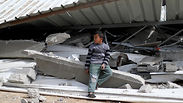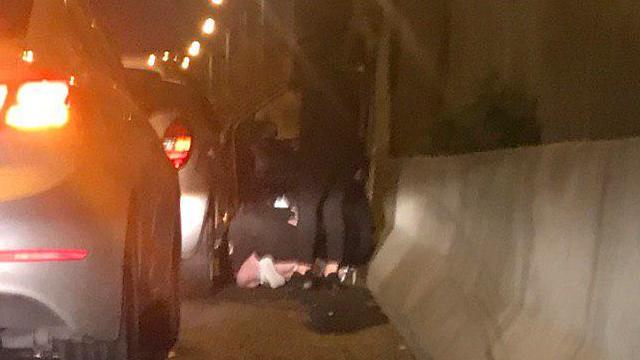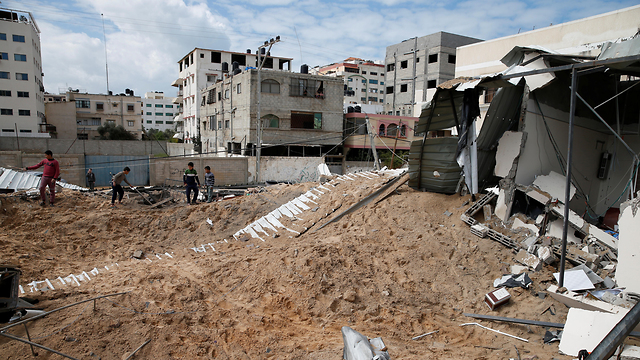
Damages in the Gaza Strip following the IAF strikes overnight Friday
צילום: רויטרס
Hamas second 'mistaken' rocket fire from Gaza
ANALYSIS: Gaza' rulers are facing a twofold problem – protests within the territory under its control, and a lack of progress in talks with Israel; so one may be forgiven for viewing their claim of an accidental launch with some skepticism
After Thursday night's lack of clarity in the wake over the origins of the two rockets fired from Gaza at the Tel Aviv area, the IDF on Friday morning stated that the Hamas terror organization was behind the attack. One of the rockets landed in an unpopulated area and the second apparently disintegrated in midair.

The IDF also assessed that the rockets were fired by mistake. But given that this is not the first time that this has happened, we can allow ourselves to be a little skeptical.

Drivers in Tel Aviv's Ayalon highway run for cover during the sirens Thursday night (צילום: רן בוקר)
The skepticism stems from the fact that in October of last year - when rockets were fired from Gaza at Be'er Sheva (hitting a family home) and the central region (falling into the sea) - Hamas fired at Israeli population centers and then denied all responsibility.
In October, Israel accepted Hamas' curious claim that the rockets had been discharged accidentally because of the poor weather. This time, the IDF has accepted that this was an accident, due to the reliability of its sources.
Hamas denied firing the rockets, and on Thursday even released the unusual statement that it would punish those responsible. The claim is that the people who fired the rockets did so without permission from the leadership of Hamas, which rules the Gaza Strip.
It seems that Hamas wants the best of both worlds – enjoying the impact of rocket fire on Israel, without taking responsibility for it.
Trouble in Gaza
So why did Hamas fire the rockets (if it were deliberate)? For two major reasons.
Firstly, because of the serious and exceptional riots that took place Thursday in Gaza with the rallying cry of "let us live," in which the Hamas police force used considerable violence against Gaza residents. The organization's leadership felt threatened as it has not felt since it seized power in the Gaza Strip in 2007.
Secondly, because of the talks with the Egyptians over a lull in the tensions along the Israel-Gaza border, which have been going on for some time. Hamas has a long list of demands, including $30 million a month (the payments from Qatar are supposed to end in April, and it is unclear whether they will continue), funding for UN-sponsored jobs, an increased electricity supply and an increased range for fishing.
Israel says that this is indeed possible, if Hamas puts an end to the "marches of return" along the security fence, the launching of the aerial incendiary and explosive devices that have become increasingly dangerous, and definitely the firing of rockets. The wheat in the south of Israel is about to ripen, and if the fields are burned, the damage will be considerable. Hamas is saying no, the marches will continue and we will keep them in check (although they were canceled for Friday, as apparently Hamas realized that a red line had been crossed).
So with talks apparently at a dead end, and in the face of a mass protest within Gaza over living conditions, Hamas realized it had to urgently channel the anger and frustration of the people under its rule at Israel.
A restrained message
The IDF's overnight response to the rocket fire included an exceptionally severe attack on the infrastructure and facilities belonging to the Hamas military wing (nor did Islamic Jihad emerge unscathed from the airstrikes).
But given that Israel has no desire to see an escalation that would require a ground invasion of Gaza during an election campaign, and so that residents of the south would not claim that only attacks on Tel Aviv elicit a harsh response, the reaction was overall relatively restrained.
Furthermore, Hamas ensured that its facilities were evacuated before the Israeli strikes began, and the IDF had no real possibility of harming senior officials, even if there had been any real desire to do so.
Both the Hamas rocket fire and the Israeli response fell within the same scale of proportionality, in which a major campaign was avoided as both sides sought to limit the incident to a short flare-up.
Even so, there are two things that could jeopardize the efforts for calm: the "marches of return" may have been canceled for Friday, but there could still be riots as Gazans mark the first anniversary of these protests at the end of the month. The second risk is of a random incident, such as a severe outcome during rocket fire at Israel or in one of the IDF attacks in Gaza. Either way, the Israeli army is ready for an escalation.











